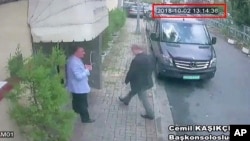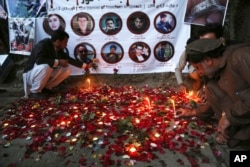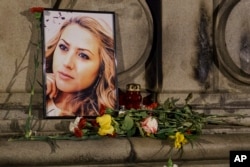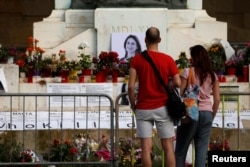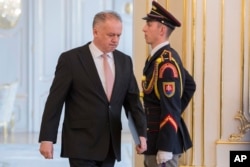The threat is growing — and so, too, the toll.
Forty-eight journalists have been killed so far this year, according to a VOA tally, adding to the thousand killed in the past decade-and-half.
Some died on dangerous reporting assignments in conflict zones as they courted similar risks to combatants and were killed in crossfire or bombings.
They include 9 Afghan reporters, among them three from VOA’s sister public broadcaster Radio Free Europe/Radio Liberty (RFE/RL).
All were killed in the same bombing incident in Kabul in April, likely planned to cause a high media death toll. It was the most lethal attack on the media in Afghanistan since the fall of the Taliban, making the country the deadliest in the world for the press this year.
But others were targeted individually, earmarked by armed groups, criminals, drug-dealers and terrorists — and, more disturbingly, by governments and politicians.
Until recently attacks on journalists more often than not occurred in less advanced countries. But now the threat is shifting to the West, where the media has traditionally been immune from violence and where media freedom is lauded and seen traditionally as an important check on authority and government wrongdoing.
In the past 12 months, three reporters have been killed in the European Union. The murder earlier this month of Bulgarian journalist Viktoria Marinova, who was beaten, raped and strangled, may not have been because of her journalism, but that still remains unclear. Days before her murder she hosted a program exploring the defrauding of EU funds by companies operating in Bulgaria.
Marinova aside, observers and analysts have no doubt that Slovakia’s Ján Kuciak, who was shot in his home alongside his fiancée, and Malta’s Daphne Caruana Galizia, who was blown up in a car bomb, were targeted because of their investigative journalism.
Caruana Galizia had been a thorn in the side of the powers that be on the Mediterranean island for years thanks to her probes into government corruption and nepotism and into the links between Malta's online gambling industry and organized crime.
According to Reporters without Borders, their deaths “have capped a worrying decline for the continent’s democracies” when it comes to the defense of press freedom. “The traditionally safe environment for journalists in Europe has begun to deteriorate,” according to the group, which notes that this year has seen “unprecedented verbal attacks on the media” as well as rising threats to investigative reporters.
In the past week, the ‘disappearing’ of Saudi Arabian journalist Jamal Khashoggi, who vanished after visiting his country’s consulate in Istanbul, where Turkish officials suspect he was murdered on the orders of the Saudi government, has prompted worldwide media outrage and a business backlash.
On Sunday, Afghan journalists joined in the chorus of condemnation, with the Afghan Journalists Safety Committee saying the possible killing of the prominent Saudi journalist was “an inhuman act no matter who or what country was behind such an offense.”
Murdering a media critic on foreign soil is being seen by journalists as yet another escalation in a dismal trend that’s seen the press increasingly targeted by the powerful or corrupt across the globe.
“From intimidation to restrictive laws and curbs on information, media outlets and individual journalists face a variety of threats to maintaining their independence and integrity in print and online,” warns Britain’s Chatham House.
This month the storied international affairs think tank gave its prestigious award annual Chatham House Prize to the New York-based Committee to Protect Journalists (CPJ) in recognition for the non-profit’s efforts “to defend the right of journalists to report the news without fear of reprisal and at a time when the free press is under serious pressure in many parts of the world.”
In September, the CPJ’s executive director warned the United Nations that governments collectively have failed to raise their voices in defense of press freedom and have allowed an alarming climate to build up by not ensuring there are consequences for attacks on the media — from intimidation and harassment of reporters to their imprisonment and murder.
On the jailing of journalists, he noted “the list is long — in fact, it's never been longer.”
Simon complained: “Governments are directly responsible for this grave abuse, and the U.N. has a culture of rarely calling out its members. But the jailing of journalists has reached unprecedented levels. At the end of last year, there were 262 journalists jailed around the world, the highest number ever recorded by CPJ. The jailing of journalists is a brutal form of censorship and is having a profound impact on the flow of information around the world. The time has come to speak out and to name names.”
But whether names will be named is another matter, say analysts. The case of Jamal Khashoggi has clearly captured international public attention, but the slow erosion of press freedom and the targeted of journalists has been building for years, they say.
In Europe, from Hungary to Poland, Germany to Italy, populists from right and left of the political spectrum have targeted the media for rhetorical disdain, say analysts. In Germany supporters of the the far-right Alternative for Germany have dug out the old Nazi slogan Lügenpresse (lying press) to taunt reporters.
In Slovakia, Prime Minister Robert Fico has dubbed reporters “filthy anti-Slovak prostitutes” and “idiotic hyenas.” In the Czech Republic President Milos Zeman once brandished a dummy Kalashnikov inscribed with the word “journalists” at a press conference, after suggesting they should be “liquidated.” And in Serbia President Aleksandar Vucic accuses journalists who criticize him of being “spies in foreign pay.”
Britain, too, is seeing a rise in threats against reporters. The BBC has had to provide on several occasions a bodyguard for the corporation’s political editor Laura Kuenssberg because of online threats mainly from the left-wingers, who accuse her of being biased against Labour leader Jeremy Corbyn.
“Political leaders are increasingly the source of the verbal attacks and harassment that create a hostile climate for journalists,” says RSF.




